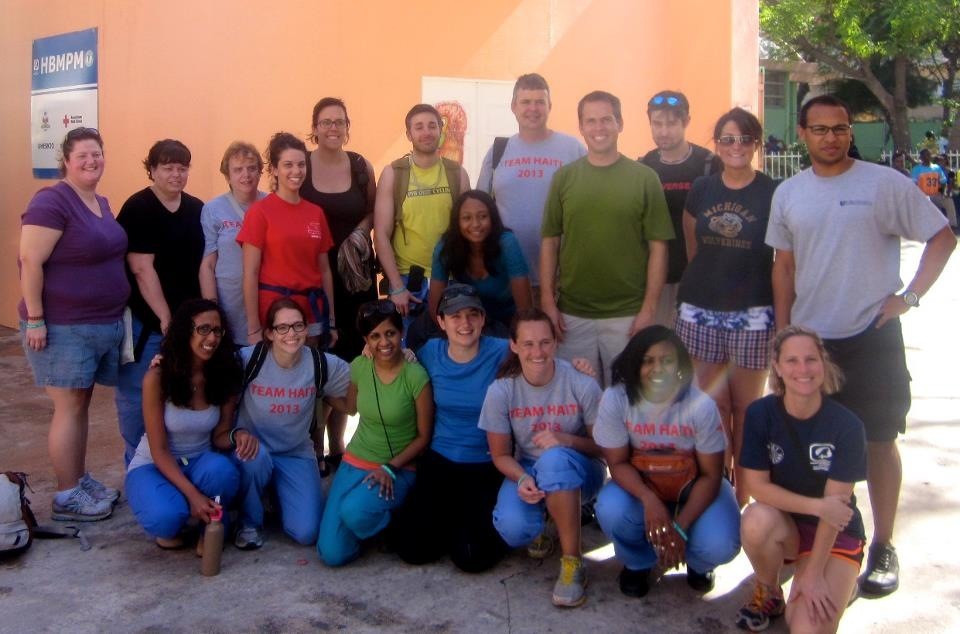
Team Haiti Returns to Port-au-Prince: Week One
A team of UC Health physicians, nurses and pharmacists is back home after traveling to Port-au-Prince, Haiti last week for their third annual medical mission trip.
UC Healths "Team Haiti began annual trips to the country after the January 2010 earthquake that devastated portions of the small island of Hispaniola, which Haiti shares with the Dominican Republic. Last week, the first group of 23 volunteers traveled to Haitis only trauma hospital to begin Team Haitis three-week rotation.
The first weeks team included physicians and nurses from emergency medicine, surgery, anesthesiology, cardiology and pediatrics. Working day and night, they staffed Bernard Mevs Hospital, run by a small cadre of Haitian health care providers and supported by Florida nonprofit organization Project Medishare.
Bernard Mevs, with three operating rooms, an ICU, ED and pediatric unit, also houses the countrys only ventilators and one of its only two CAT scanners.
UC Health emergency medicine physician Stewart Wright, MD, says the ED, med/surgery ward and ICU combined were still smaller than one of the pods in the University of Cincinnati Medical Center ED.
"We maxed out at four ICU patients, nine in-patients and four ER patients, he says.
Wright and others had to work outside the hospital gates to triage waiting patients.
"We had to turn away some away, he says. "We assessed them outside the gates and once we realized what we could do and what we couldnt do, we would see if there was another hospital that could provide the same care.
That care, he saw, was very different than what hes used to providing in Cincinnati.
"Treating a heart attack in Haiti is very different, says Wright. "There are no cardiologists, no cath labs, no thrombolytics. You give the patient an aspirin and all the medications you can think of to support them through the disease, and you hope they get better.
He says the team also worked to improve the conditions and care at Bernard Mevs. They trained the staff on operating donated medical devices from Sonosite ultrasound machine and Cheetah NICOM monitors, and trauma surgeon Christina Williams, MD, assisted Haitian surgeons in refining their techniques.
Nicole Harger, PharmD, an emergency medicine clinical pharmacy specialist at UCMC, had traveled with Team Haiti in 2011, and said she was "pleasantly surprised at the progress made since her last trip.
No longer a collection of jumbled medications, the Bernard Mev pharmacy was better organized and the pharmacists more proactive and independent.
"They are much farther along, she says. "The staff was very engaged and the pharmacy was better staffed.
Harger spent some of the week training the pharmacists in calculations and sterile preparationsand says she had to spent some of learning as well.
"Theres definitely a lot of thinking outside of the box and being creative with our resources there, says Harger. "We had to figure out different regimens for some of the bugs that we werent used to and even everyday things based on the medications we had available to us.
Wright says Haitian physicians could diagnose tropical diseases like malaria, cholera and typhoid with a glance and a patient history. "Things you would never see here, they saw all the timethey would look at a patient and figure it out, he says.
The team even saw two cases of miliary TB, a severe form of tuberculosis, during the week.
"It was very rare, says Wright. "Both patients were critically ill, both on ventilators and so young. One even made it through and was discharged.
Back in Cincinnati, Wright says he returned to the UCMC ED with a renewed appreciation for the teamwork among UC Healths providers and "for what we have, who we have and the help that we provide each other.
"You have to give back, he says. "Were so blessed here, both at the hospital as well as personallyyou have to give something back if youre in such a good place.

Members of UC Team Haiti in the pediatric unit at Haiti's Bernard Mevs Project Medishare Hospital.
Tags
Related Stories
UC lab-on-a-chip devices take public health into home
May 8, 2025
University of Cincinnati engineers created a new device to help doctors diagnose depression and anxiety. The “lab-on-a-chip” device measures the stress hormone cortisol from a patient’s saliva. Knowing if a patient has elevated stress hormones can provide useful diagnostic information even if patients do not report feelings of anxiety, stress or depression in a standard mental health questionnaire.
Study explores social media’s growing influence on cosmeceutical...
May 7, 2025
The University of Cincinnati's Kelly Dobos spoke with Cosmetics Design USA about new research that revealed a significant rise in consumer interest in cosmeceuticals, or cosmetic products with active ingredients purported to have medical benefits.
UC, UC Health see frontline student training as workforce...
May 6, 2025
Amid ongoing challenges across the health care workforce, including burnout and shortages, the University of Cincinnati is working to tackle this issue through a program that embeds students in clinical settings.
